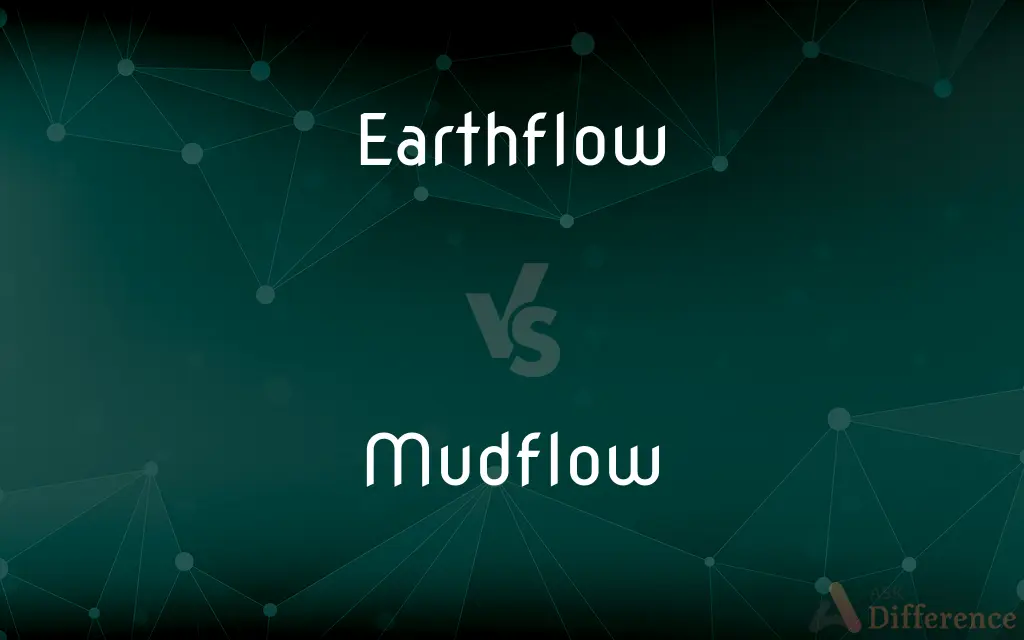Earthflow vs. Mudflow — What's the Difference?
By Tayyaba Rehman — Updated on November 3, 2023
Earthflow is the slow movement of soil down a slope, while mudflow is a rapid flow of water-saturated earth materials.

Difference Between Earthflow and Mudflow
Table of Contents
ADVERTISEMENT
Key Differences
An earthflow is a type of landslide involving the flow of soil and other earthen material down a slope, which can occur gradually over time. It is usually a slow process that may not be immediately noticeable. A mudflow, in contrast, is much more rapid, as it is a fluid, flowing mixture of water and earth materials, like mud, that can surge downhill suddenly, often as a result of heavy rainfall or rapid snowmelt.
The material composition in an earthflow is primarily soil mixed with varying amounts of finer particles and organic matter. This mixture tends to move downhill in a coherent mass. In mudflows, the material is predominantly fine-grained sediments, such as silt and clay, combined with large amounts of water, which give it a more fluid consistency, allowing it to move more swiftly than an earthflow.
Earthflows often occur on slopes that are weakened by saturation from water sources like rain or snowmelt but can also be triggered by earthquakes or human activities. Mudflows are typically triggered by sudden events, such as heavy rain, volcanic eruptions, or the rapid melting of snow or ice, which saturates the ground with water and increases the downward force on the slope.
The speed of an earthflow can vary but generally moves at a pace where changes can take days, weeks, or even years to become significant. Mudflows are often part of a rapid onset of hazardous conditions, potentially occurring with little warning and capable of causing immediate destruction to structures and landscapes.
While both earthflows and mudflows are natural processes that result in the downslope movement of earth materials, the risk they pose varies greatly. Earthflows can damage property over time, disrupt roadways, and reshape landscapes slowly. Mudflows present an immediate danger to life and property, capable of sweeping away almost anything in their path.
ADVERTISEMENT
Comparison Chart
Speed
Slow-moving
Rapid, often sudden
Water Content
Less water, more solid earth materials
High water content, more fluid
Trigger
Saturation over time, human activity, earthquakes
Heavy rainfall, volcanic activity, rapid snowmelt
Material Consistency
More cohesive, soil-based
Slurry-like, with fine-grained materials like silt and clay
Visibility of Movement
Gradual and often less noticeable
Sudden and clearly observable
Compare with Definitions
Earthflow
A slow landslide that can reshape land over time.
An earthflow had altered the hillside's original shape significantly.
Mudflow
A type of landslide with a high content of liquid mud.
The heavy storm triggered a mudflow that blocked the highway.
Earthflow
The gradual downslope movement of soil and rock.
The road was closed due to an earthflow that had covered it over several months.
Mudflow
A rapid flow of water-soaked earth materials down a slope.
The village was evacuated due to the threat of an imminent mudflow.
Earthflow
A type of mass wasting featuring flow of earth materials.
The earthflow advanced slowly, creeping towards the valley.
Mudflow
A fluid mass of muddy earth moving swiftly downhill.
After the volcanic eruption, a destructive mudflow ensued.
Earthflow
The downward movement of soil under the force of gravity.
Heavy rains last year have accelerated the earthflow in this area.
Mudflow
A fast-moving river of mud caused by water saturation.
The mudflow's force was strong enough to uproot trees.
Earthflow
A geomorphological phenomenon involving earth movement.
Geologists are studying the long-term impact of the persistent earthflow.
Mudflow
A geologic hazard consisting of a flowing mix of soil and water.
Houses built on the floodplain were swept away by the mudflow.
Earthflow
An earthflow (earth flow) is a downslope viscous flow of fine-grained materials that have been saturated with water and moves under the pull of gravity. It is an intermediate type of mass wasting that is between downhill creep and mudflow.
Mudflow
The deposit resulting from such a flow.
Earthflow
Motion of a saturated mass of fine-grained sediment down a slope, especially when made fluid by excessive rainfall; an instance of this.
Mudflow
A mudflow or mud flow is a form of mass wasting involving "very rapid to extremely rapid surging flow" of debris that has become partially or fully liquified by the addition of significant amounts of water to the source material.Mudflows contain a significant proportion of clay, which makes them more fluid than debris flows; thus, they are able to travel farther and across lower slope angles. Both types are generally mixtures of various kinds of materials of different sizes, which are typically sorted by size upon deposition.Mudflows are often called mudslides, a term applied indiscriminately by the mass media to a variety of mass wasting events.
Earthflow
A downslope viscous flow of fine-grained materials that have been saturated with water, moving under the pull of gravity.
Mudflow
A fluid or hardened stream or avalanche of mud.
Mudflow
A flowing mass of soft, wet, unconsolidated earth and fine-grained debris, made fluid by rain or melted snow and often building up great speed.
Mudflow
A type of landslide characterized by large flows of mud and water.
Mudflow
The dried-out product of such a flow.
Common Curiosities
What are the dangers of a mudflow?
Mudflows can rapidly destroy structures, remove soil, and pose a serious threat to life and property.
Are earthflows common in urban areas?
They can occur in urban areas, especially on sloped terrains or where there is land alteration.
How can I protect my property from a mudflow?
Implementing proper drainage, barriers, and avoiding building in vulnerable areas can help.
Do mudflows happen in dry climates?
Mudflows can occur in dry climates if there is a sudden influx of water, like from heavy rain.
How long does an earthflow last?
An earthflow can last for several weeks to years, moving incrementally.
How fast can a mudflow travel?
Mudflows can travel at speeds up to 60 miles per hour (97 km/h) or more.
What's the impact of earthflows on the environment?
Earthflows can lead to habitat alteration and changes in landscape over time.
What causes an earthflow?
An earthflow is often caused by water saturation, human activity, or seismic events.
Can vegetation affect an earthflow?
Yes, vegetation can stabilize the soil and potentially slow down an earthflow.
Can we predict when an earthflow will occur?
Earthflows are hard to predict accurately due to their slow progression.
How do I know if my area is at risk of earthflows or mudflows?
Geological surveys and historical records can indicate if your area is at risk.
What is the composition of a mudflow?
A mudflow is mostly composed of fine-grained particles like silt and clay mixed with water.
Can earthflows be stopped?
It is difficult to stop an earthflow; mitigation efforts focus on managing and diverting the flow.
Are mudflows related to weather conditions?
Yes, intense rainfall or rapid snowmelt often triggers mudflows.
Can a mudflow occur in the same place as an earthflow?
Yes, if conditions change, an earthflow area can become a site for a mudflow.
Share Your Discovery

Previous Comparison
Metallophone vs. Glockenspiel
Next Comparison
Troop vs. TroupeAuthor Spotlight
Written by
Tayyaba RehmanTayyaba Rehman is a distinguished writer, currently serving as a primary contributor to askdifference.com. As a researcher in semantics and etymology, Tayyaba's passion for the complexity of languages and their distinctions has found a perfect home on the platform. Tayyaba delves into the intricacies of language, distinguishing between commonly confused words and phrases, thereby providing clarity for readers worldwide.














































